At the Movies--Was My Great-Grandfather a Revolutionary? Part Two

An open thread review of current political movies!

As you can see, I've changed the Open Thread a bit. I've decided to focus on movies with overtly political themes. I'm going to mostly focus on current movies, but when there are none, I'm going to dig around in Netflix and Amazon Prime to see if I can find some great old political movie that I can share.
I'll be giving y'all a review, and rating the movies on a scale of 1 to 5 Savios.

A no-Savio movie is working for the machine: destructive to truth, human rights, or continued life on this planet. A five-Savio movie is indispensable to anyone fighting the machine.
If anybody has a movie they want me to bring to the attention of the community, please send me a private message and I'll review it.
This is the second part of my review of The Cuba Libre Story (episode 1).
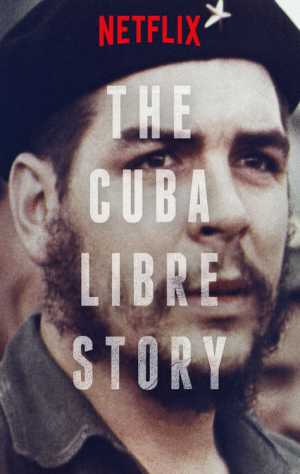
"My father didn't come through Ellis Island," my grandmother said, with a look of distaste on her face for the poor slobs who came through Ellis Island. "He didn't have to come through immigration. He was friends with Teddy Roosevelt. I sat on his knee when I was a little girl and he gave me pennies."
Thus does the illegal, or at least undocumented, immigration of my great-grandfather to this country, in which he lived and died in poverty, gain the glamour of being personally connected to a future President.
Why is it that Americans who immigrate here are so eager to distance themselves from everyone else who immigrated here? I don't hear a lot of indigenous people talking like this, but then I don't know a lot of indigenous people (apart from, I suppose, my partner who is the last generation who could have claimed a place on the res, but she wasn't raised there.) You'd think that everybody who immigrates here wants to be anything other than an immigrant: either they want people to think they sprang from the rocks and trees of North America 4,000 years ago, or they want you to believe they are European aristocracy. The last time I was in Pittsburgh, a very proud woman with a thick Italian accent told me she had been born in Northern Italy and came here 50 years ago as a child--right before she went into a rant about dark-skinned Africans who come here and don't learn how to talk English right.
Yet, oddly, I believe my grandmother's story--not the romance she constructed around the facts, but the facts themselves. I actually think my great-grandfather may have gotten into this country because Theodore Roosevelt pulled some strings (it wouldn't have taken much in those days) and I think my grandmother may well have sat on TR's knee and gotten pennies.
I left off in 1895, when things started to get complicated. Jose Marti, having nurtured a revolution on the US mainland and rallied former revolutionaries in Cuba to the cause, got killed early in the war, but this time, the death of the most visible leader of the revolution did not end the revolution--perhaps because Marti, unlike Cespedes, was not a military leader (he was a great poet, organizer, and propagandist, but was in no way a soldier). Or perhaps the revolution continued because Spain brought in a real butcher on the other side.
Since Spain was having trouble putting down the Cuban revolution, they sent a man named Valeriano Weyler, who functioned something like a Spanish Oliver Cromwell. The revolutionaries had support in the countryside, so Weyler depopulated the countryside. 400,000 people were resettled. Those who wouldn't move were shot. Afterwards, Weyler razed the abandoned rural villages and farms. He crammed as many people as he could into Cuba's cities; then, when the cities were overflowing, he created concentration camps. Between 155,000 and 170,000 died.
The problem for empires (not the problem with empires, which is different) is they so often can't figure out when the crackdown against revolution becomes the thing which makes revolution inescapable. To be fair, sometimes the butchery works. About 40 years later, the Spanish would do basically the same thing in my great-grandfather's home province of Asturias, bringing a terrible person (in this case, General Franco) back to put down a stubborn left-wing rebellion against fascism. Franco took care of that, and managed to stay in power until his death in 1975, making him one of the most successful right-wing tyrants of his time. However, it's one thing to put down a rebellious province in your own country, and another to put down a rebellion in a colony over 3,000 miles away. Weyler only succeeded in spreading misery and wrecking half the country.
Here's the problem with empires: it's hard to get out from under one without a second empire taking its place, especially if you're a colony in the midst of competing empires.
I don't know to what degree Marti and others knew what they were doing when they smuggled photos of atrocities to the US press, most particularly to Joseph Pulitzer and the odious William Randolph Hearst. Maybe they felt that anything was better than Spanish colonialism. Maybe they had idealistic notions about the United States. I don't know, but both Pulitzer and Hearst apparently couldn't get enough of pictures and stories of the Cuban revolution, and Hearst, at least, was no idealist.

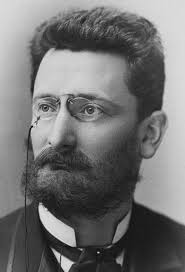
I think both men were preparing the ground for the establishment of what was, in effect, a U.S. protectorate in Cuba.
It must have been clear to the American government of the time (McKinley was president) that the Spanish hold on its empire was weakening. As early as 1896, the chief U.S. diplomat in Cuba had insisted a fleet should be kept nearby to protect "American interests, assets, and citizens" in Cuba.
I hate the phrase "American interests."
I doubt very much that there was anything legitimately pertaining to the United States in Cuba in 1898 that actually warranted sending our fleet's flagship down there. The Spanish saw it as an act of aggression, and, much as I oppose Spanish colonialism, I'm forced to say I would have seen it as an act of aggression too. How else *can* you see it?
What happened afterward is well known. The Maine exploded in Havana Harbor at 9:40 p.m. on February 15, 1898. 261 of the 355 men aboard were killed. The incident remains controversial to this day.
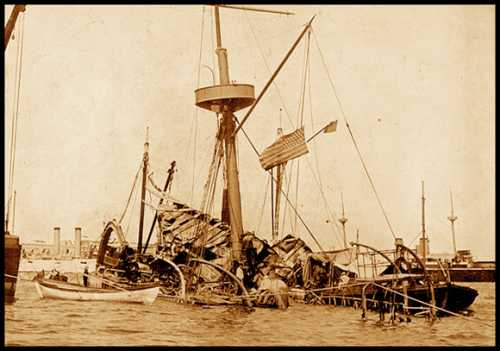
However, The Cuba Libre Story is unfailingly fair. They present three different views of the destruction of the Maine. They give first what a Cuban expatriate describes as "Castro's view," which is that the United States blew up the Maine itself to have an excuse for war. Castro's view or not, it seems pretty likely to me. What in the name of God would make us send our brand-new flagship down there, by itself, to...well, to do what? One ship can't blockade a harbor, can it? Perhaps someone who knows more about naval warfare than I do could explain what legitimate military use the Maine was, sitting down there in Havana harbor, apparently doing nothing whatsoever for weeks. Was it an implicit threat to the Spanish...but what would the threat have been? Refrain from murdering Americans currently residing in Cuba? Keep your hands off Florida? The Spanish weren't likely to offend in either of these ways. They were colonial tyrants, not idiots. Was the message "Stop mistreating the Cuban people?" If it was, I'm not sure sitting in the harbor doing nothing for weeks is going to convey a deep concern with their well-being.
It worked great as a false flag operation, though:
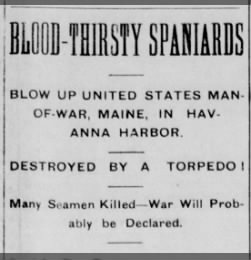
The Cuba Libre story gives two other theories of what happened. It is true that if Cuban revolutionaries could have gotten on board to blow up the Maine, that would have been an extremely intelligent thing to do, if only they could have done it and not gotten caught. I think this is a high-risk maneuver unlikely to succeed without inside help, but it shouldn't be altogether discounted. A German historian presented an opinion I'd never encountered before: that the Maine blew up due to a technical failure and no one was to blame!
This is where Teddy Roosevelt came in. He was, in 1898, the Assistant Secretary for the Navy under McKinley. He resigned his office to create the Rough Riders, a volunteer cavalry unit, and go to fight the Spanish in Cuba.
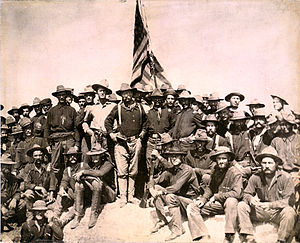
Oddly, you could argue that this is where Roosevelt created the image of himself which got him the Presidency, and that, if the Maine had not exploded, Teddy Roosevelt would never have been President.

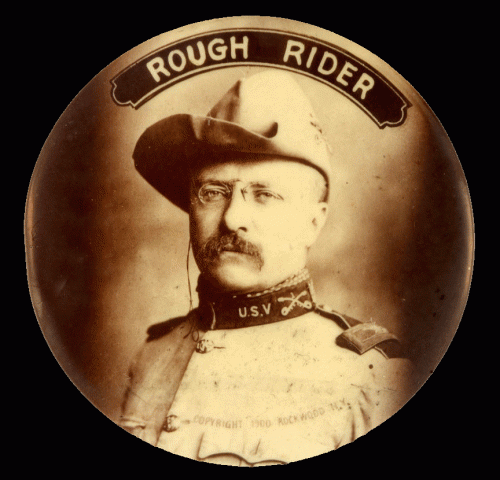
Sometime in the 1890s--exactly when is hard to ascertain--my great-grandfather came to Cuba with the Spanish Army. He was not a soldier, according to family lore, but some kind of clerk. He married a Cuban woman, and had three sons. When his first wife died, he looked to the family of my great-grandmother for a wife. It made sense; they were transplanted Asturians themselves. My great-grandfather must have felt at home with them. The fact that they were willing to marry their daughter to him suggests, as I said before, that my great-grandmother's family was not in favor of the revolution, but considered themselves good Spanish subjects.
Meanwhile, their mother country was in trouble. Obviously outmatched militarily and 3,000 miles away rather than 90, Spain had no chance in the Spanish-American war. Spanish soldiers were sent out untrained, ships not fully constructed, loaded with dummy grenades rather than gunpowder. The entire fleet was defeated in 2 hours. 323 Spanish sailors were killed...and one U.S. sailor.
As I hear the story, the only part of it that makes sense is what the Cubans are doing. The actions of both Spain and the United States seem farcical. Yet it is those actions that may have brought my great-grandfather to the New World, and certainly brought him to the United States.
The first child of my great-grandparents to be born in the United States was my aunt, originally named Florida in honor of their coming here. She was born in 1904. So, by the 1890s, my great-grandfather had come from Spain to Cuba. And by 1904, at the latest, my great-grandparents had emigrated to the United States. But what happened in between?
If my great-grandfather was really friends with Teddy Roosevelt, how did that friendship come to pass, given that they were on opposite sides? My mom says, caustically, that given the kind of person Theodore Roosevelt was--"He thought it would be beautiful for his sons to be wounded in battle, or even die," she says--that probably he would have been friends with any soldier. Still, all reports are that my great-grandfather wasn't much of a soldier!
Did my great-grandfather switch sides when he saw how the wind was blowing? If he was friends with Teddy Roosevelt, why couldn't he stay in Cuba after it basically became an American protectorate? Why did he have to leave the country where he had been reasonably well-off and moving in society, to come to a place where he and his wife and children would live in poverty for the rest of his life?
Certainly anyone friendly with the Americans should have had a good time in Cuba after the Spanish-American War. Although Cuban independence was promised, American businessmen had taken control of Cuba's economy, and we actually made demands of Cuba in exchange for withdrawing our troops. Very heroic of us.
We demanded:
A Cuban Constitutional Convention--not a terrible idea
Certain guarantees that American property in Cuba would be protected, and assurances that if it were not, the United States had the right to militarily intervene--
And that the United States was authorized to establish military bases in Cuba--
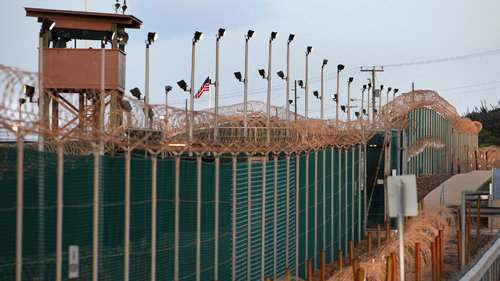
So that we could, through Guantanamo Bay, control access to the Caribbean and the Panama Canal, which we began building right away:
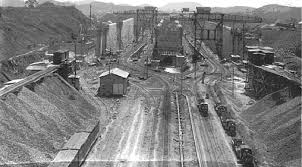
The author, or at least the purveyor, of these loathsome policies, was an American senator with the lovely name of Orville Platt, a conservative Republican from Connecticut, who was, in the 1890s, one of four men who controlled the Senate:
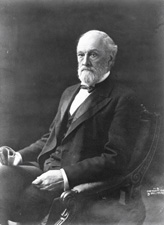
This doesn't look much like the revolution Marti had wanted. Cuba had managed to loosen Spain's grip, but it was the United States that came in and knocked Cuba out of Spain's hands--and it wasn't to pick Cuba up, dust Cuba off, thump Cuba on the back in a friendly way, and walk off whistling. We replaced Spain.
When the first Cuban election was held, there were two candidates. The first was a general who had been prominent in the war for independence. The second was a schoolteacher in Philadelphia, who had lived most of his life in the United States. Inexplicably, the general withdrew his candidacy and the teacher, Tomas Estrada Palma, ran unopposed to become the head of state of a country he barely knew.
Look, I know colonialism when I see it. If it looks like a duck, walks like a duck, sounds like a duck...
But where does that leave my great-grandfather? If he had been friends with Teddy Roosevelt, why couldn't he just stay in Cuba, which was basically in American hands after 1898? Is it because he and his wife were on the Spanish side in the war? Yet my great-grandmother's family kept their money during the war, and the revolution apparently caused them no trouble. I know, because my grandmother once went to visit them as a child, and they were still rich. Perhaps the problem was that my great-grandfather was more than just a supporter of Spain--he was affiliated with the Spanish military itself.
But if my great-grandfather wasn't friends with Teddy Roosevelt, how did he emigrate without papers or processing? Was the whole thing a fable, made up by my grandmother and her father to cover up the ignominy of coming over illegally in a boat?
What I know for certain: my great-grandfather was in the Spanish Army in Cuba in the 1890s, and that afterward he came to the United States, where he settled in Florida, and lived in poverty for the rest of his days. He brought with him a wife of the Cuban upper class, and two little girls. She would bear him three more girls and a boy before she died, taking in people's washing and attending at their childbeds to add to their meager income.
Which side was he on? How did he go from being a military officer marrying into a wealthy colonial family to being an extremely poor, extremely proud, and as far as I can tell, completely undocumented immigrant?
The only way I could have gotten close to the truth would have been to talk to my Aunt Peachie before her death in 1987. I wish I had thought to do that. The things you don't think of when you're young.
I give the first episode of The Cuba Libre Story 2 1/2 Savios for being historians instead of polemicists or liars.




Comments
Good morning, everybody!
"More for Gore or the son of a drug lord--None of the above, fuck it, cut the cord."
--Zack de la Rocha
"I tell you I'll have nothing to do with the place...The roof of that hall is made of bones."
-- Fiver
Thanks. Good history and story. Extra information -
by 1905, 1906 the Maine would've been obsolete on the ground. It is extremely likely that by 1898 the navy and naval experts had a strong inkling of that fact.
That, in its essence, is fascism--ownership of government by an individual, by a group, or by any other controlling private power. -- Franklin D. Roosevelt --
@enhydra lutris Well, that looks like one
Well, that looks like one more data point in favor of the US blowing it up ourselves.
"More for Gore or the son of a drug lord--None of the above, fuck it, cut the cord."
--Zack de la Rocha
"I tell you I'll have nothing to do with the place...The roof of that hall is made of bones."
-- Fiver
Since this is an open thread, I'll toss this in the pot
It's a video by John Green on the subject, "a beginner's guide to America's health care reform woes". In part it deals with why we cannot have an adult discussion of the issues and problems, and in part serves as a general refresher and possible source of new information. I recommend not only watching it, if only as a refresher, but also in order to be able to tout it to friends, family, neighbors, co-workers and, generally, all comers. Here it is:
That, in its essence, is fascism--ownership of government by an individual, by a group, or by any other controlling private power. -- Franklin D. Roosevelt --
Very good, thanks e.l.
Now I want a duckling! My dog would probably dispatch.
She is over a year old, and has not made a kill that I know of.
My children's g-grandfather did come thru Ellis Island. A Jew from Slovakia region who left early. I think that surname is extinct now over there. Since my husband is dead, some family history is gone. He came thru Ellis, married a British Jew and had a marginal life in NYC. His son, kid's grandfather, prospered in Property management working for a wealthy developer group, the Roses.
Husband had a Methodist mother and a Jewish father. Hub became a-religious. His father eventually converted to Methodism before he died.
Hey! my dear friends or soon-to-be's, JtC could use the donations to keep this site functioning for those of us who can still see the life preserver or flotsam in the water.
Gas attack in Syria: "an unacceptable massacre"
Does that mean that some massacres are acceptable? Sorry to quibble but I am overcome with outrage over the gas attack in Syria. After the first attack, the hospital treating the victims was also attacked. It's the work of a maniacal tyrant, Assad? ISIS? the results are the same wherever you lay the blame.
No use relying on the bumbler in the White House to intervene but surely there are intelligent compassionate people in the US (and the rest of the sane world) who can stop this.
To thine own self be true.
I am fascinated by your story, CSTS
It is funny how many of us do not know much about our own family histories. I love how you are tying your family history with that of Cuba. It is weird, having grown up in Florida and not really knowing the history of Cuba. I can hardly wait for the next installment.
Do I hear the sound of guillotines being constructed?
“Those who make peaceful revolution impossible will make violent revolution inevitable." ~ President John F. Kennedy
Another really nice and interesting post
Thank you, CSTS. I'll look around for the Cuba Libra Story!